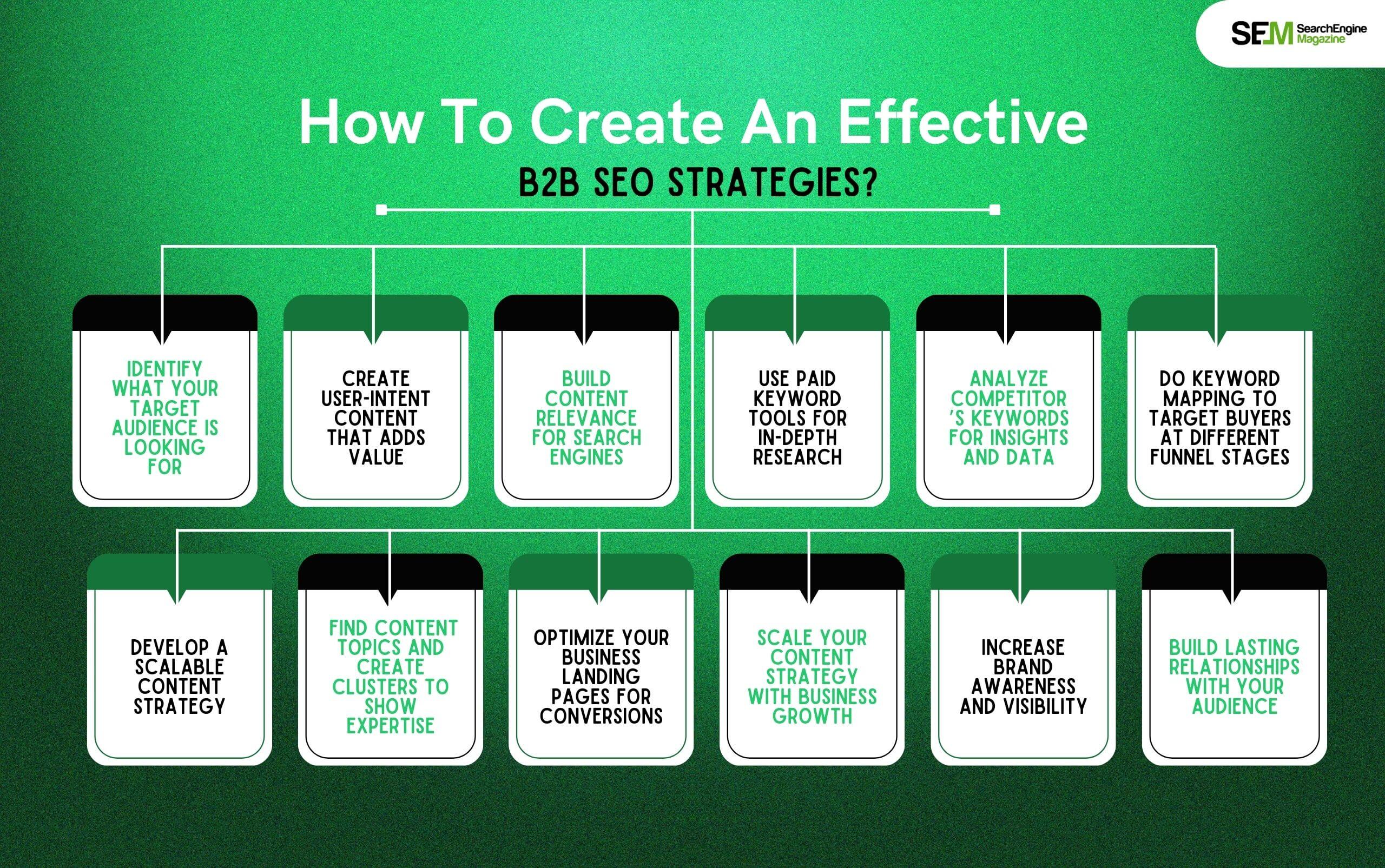Why Good Web Design Is Now A Core Ranking Factor?
Dec 29, 2025

Dec 29, 2025

Dec 26, 2025

Dec 26, 2025

Dec 26, 2025

Dec 24, 2025

Dec 24, 2025

Dec 23, 2025

Dec 23, 2025
Sorry, but nothing matched your search "". Please try again with some different keywords.


After spending most of my career working in B2C markets, when I first set foot in the B2B world, I was taken aback. It wasn’t as easy as it seemed – it took me more than 4 years to understand the B2B SEO strategies that worked for my business.
It was certainly a struggle of sorts.
However, that doesn’t mean you have to go through the same – I have documented below a step-by-step, comprehensive guide for implementing the most effective B2B SEO strategies and growing your business.
Stay tuned.
B2B SEO strategies are rooted in helping business website pages perform well in different search engines such as Bing and Google. Unlike B2C SEO, here the focus is on crafting content with keywords that decision-makers in a company search for while working.
Is B2B SEO different from B2C SEO?
Technically, yes.
I’ll tell you how. When you take Google’s ranking factors, you will see that SEO is the same for both B2B and B2C. This means that there is no such B2B algorithm or any special factor that you can work to rank in search result pages.
Moreover, the same practices apply to both B2B and B2C. However, when you look at it practically, you will see that B2B SEO is different from B2C SEO.

| B2B SEO | B2C SEO |
| Targets keywords that have a low search volume. | Targets keywords that have a high search volume. |
| Publishes content for company decision-makers. | Publishes content for a broader target audience. |
| Keywords typically have a high CPC. | Keywords typically have a low CPC. |
| Minimal social media marketing. | Focused social media promotions. |
| Creates technical and tactical content. | Creates fun and emotional content. |

So, now that you have a fair idea about the primary differences between B2B and B2C SEO, you can understand the difference lies more in the application and not the theory behind the same.
Niche-focused strategies are especially powerful here – for instance, if you’re targeting a specialized market like private practices, this guide to SEO for therapists shows how user-intent content can directly serve the needs of a very specific audience.
To simplify things, I’ve explained how to create effective B2B SEO strategies in phases for a more comprehensive understanding of the best SEO practices for B2B brands.
So, here are the major steps for creating an effective B2B SEO strategy, which I have explained in detail below:
If you aren’t empathetic, you cannot really understand what your audience expects from your brand.
Here are some steps to get to know your customers better. Like others, most customers use Google to search for products.
Google something similar to what the clients are looking for. Hence, you will understand what sort of info or ideas can engage customers.
Your b2b seo content strategy can fail if you don’t sync your content ideas with the customer’s needs.
So, your prime goal is to cover the imminent interests and goals of the customers in your content. In addition, you need an editorial calendar.
You can record your editorial calendar’s release dates, topics, and most effective channels.
You must help the search engine understand the content’s relevance to gain traction. There are many ways of doing so. However, experts prefer having good content ‘metadata.’
Your Metadata helps search engines to understand the HTML elements.
Again, HTML elements clarify the information in your website and communicate the same with the search engine.
Free keyword tools can help you create barely relevant content. But you will need paid keyword tools to dig deep.
You must include relevant keywords if you want your content to be visible. For that, there is no alternative to paid keyword tools.
Ahrefs and Semrush are quite popular paid keyword tools in the US. Already, 21,958 B2B companies are using Ahrefs for their content marketing.
If you are a beginner in content marketing, your best lead can be competitors’ keywords.
Find some high-ranking web pages of competitors. Then, search for the keywords that help them drive organic traffic to their pages.
Looking for a pro tip? I’ve got you covered.
Run any competitor’s site through Semrush’s’ Organic Research’ platform.
Are you stuck at mapping keywords?
Wait. Have you got your search intent right? You must be able to identify the accurate search intent for each stage of your marketing funnel.
You can start keyword mapping with a simple Excel Spreadsheet. Start by tracking the target keywords, search volumes, and content you will create in separate Excel sheet columns.
To create scalable content, I recommend writing blogs. You may write posts that respond to FAQs of your prospects. As an outcome, they will get to know you. Meanwhile, you can create content to introduce them to your business.
You can research Semrush’s topic research to set your content strategy.
Topic clusters show that you really gave a grip on the topic you are writing about.
If you can mesmerize customers with robust content, they’ll be your clients soon. To create topic clusters, you can create pages that explore a central theme in depth.
The individual pages in your topic cluster answer specific questions of your customers. At the same time, they link back to the pillar. A pillar page is where you write you explore the broad topic in depth.
If you are a B2B company, then you must choose your landing pages correctly. It’s the real trick to your B2B SEO strategy.
Commonly, you should target those pages that talk about:
To optimize these pages, you can use an On-page SEO Checker.
You must update your content calendar with new keywords and shuffle your content cluster. As your business grows, you can incorporate new products and services. After that, you must search for and attract new clients.
B2B search engine optimization tools can help you gain organic visibility across the buying cycle. But you need to improve your content game through relevant content creation and better link building. As a B2B/SaaS company, link building lets you get the best SaaS backlinks.
PRO Tip: Make your content easily discoverable. Customers trust brands whose content can be discovered upfront. As a result, you can easily build lasting relationships with your target audience easily.
We’ve discussed the best B2B SEO strategies to lift your game. Many robust B2B SEO strategies are discussed here. It’s your turn to read avidly and detect the B2B SEO best practices that suit your business.
Here’s a summary of the pro tips for better B2B SEO marketing:
Barsha is a seasoned digital marketing writer with a focus on SEO, content marketing, and conversion-driven copy. With 7 years of experience in crafting high-performing content for startups, agencies, and established brands, Barsha brings strategic insight and storytelling together to drive online growth. When not writing, Barsha spends time obsessing over conspiracy theories, the latest Google algorithm changes, and content trends.
View all Posts
Why Good Web Design Is Now A Core Ranking Fac...
Dec 29, 2025
The Quiet Arrival of True Color: How E-Ink Te...
Dec 26, 2025
Top 7 SEO Use Cases AI Automation Can Handle ...
Dec 26, 2025
Beyond SEO For Travel Agency: The Psychology ...
Dec 26, 2025
How To Get Verified On TikTok? Tips To Boos...
Dec 24, 2025

